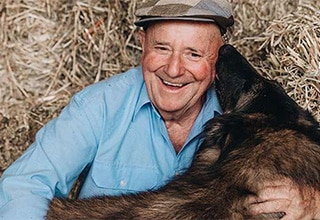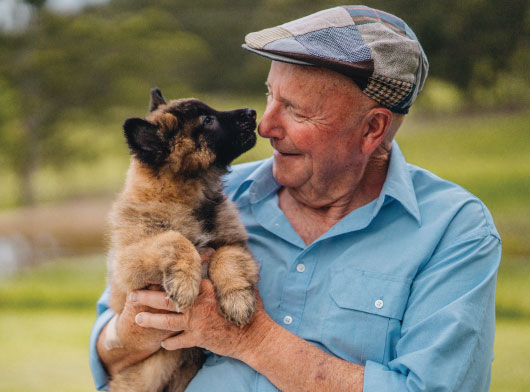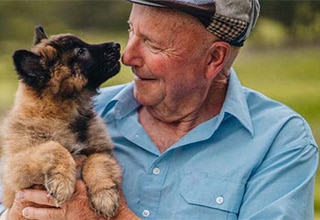- text
-
# Depending on your level of cover. Policy T&Cs, limits, exclusions, waiting periods and annual excess may apply.
Dr Harry: Where should I buy or adopt a dog?
From purebreds to designer dogs, it’s important to know where to look and who to contact when it comes to purchasing your furry companion. As the old TV ad used to say,’ ‘where do you get it?’ Well, don’t worry, there are plenty of avenues.
Purebreds
Let’s start with a pure breed; perhaps you fancy a Labrador because they are very good with children, or maybe a Cavalier King Charles, for the same reason, but your yard is smaller and the children younger. My suggestion is that you contact the purebred dog association in your state, such as , and for example. They have a list of registered breeders of whatever pedigreed dog takes your fancy. Generally, they can put you in contact with the secretary of that particular breed you had in mind and usually have a list of breeders that have puppies available or will do soon.
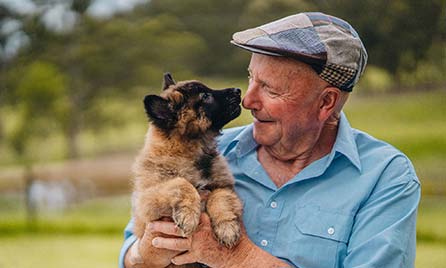
This affords you the opportunity of meeting the parents of the litter, which is something I always suggest that you do, remembering that their puppies will be very much like the dog that sired them and the mother that carried them and raised them. On top of this, it’s a good time to think about heritable problems like Hip Dysplasia, and there are others too, depending on individual dog breeds. Responsible breeders will discuss problems like Hip Dysplasia and explain what it is and what they are doing to try to minimise the incidence in their breeding program. There are not many dogs that are totally free of the problem. You'll get quite a deal of reading material on diet, exercise and training. Try to follow what is suggested, at least to start with, and then talk to your vet when it comes time for that first check-up and booster vaccination if you want to start changing things. Registered breeders are governed by rules and regulations of their different societies, but usually, they will do things like take the puppy back within five days if things are not working out. They are always there for advice and further information if needed. Depending on which state you live in, your puppy will be ready to go from eight to nine weeks of age.
The internet has become the marketplace for just about everything, and that includes puppies and kittens. There are plenty of stories of people paying thousands, often paid as a deposit for a non-existent dog. Please be careful. It’s so easy to buy on impulse. The problem I see is that once a breed becomes very popular, everybody jumps on board and becomes a ‘breeder’. These people are rarely registered, and the aim is to make a fast dollar, rather than to care for the long term welfare of the breed, and that includes the puppy they sell you. In NSW, any person breeding dogs must have a Breeder Identification Number. Puppies should also be microchipped and that number can be verified through the NSW Pet Registry. This is your safeguard. In other states, regulations may differ, but a quick call to the appropriate breed club will soon tell you how genuine the ‘breeder’ is.
Designer dogs
Years ago they were crossbreeds’ and the result of accidental mating. These days, it’s just the opposite. We have planned matings. This started when we tried to create a guide dog for vision-impaired people allergic to dog hair. Along came the Labradoodle. Today there are so many poodle crosses to choose from, for anyone that might be allergic to dog hair, but a word of caution: in any cross, some of the pups will fit nicely in the ‘middle’ coat wise, but some will be either very poodle like (which is good), and some that are not (which doesn’t help your allergy problem)! We call this the ‘random distribution curve'.
There are just so many crosses available today, that you need to look wisely at both parents, remembering that your dog will sit somewhere in the middle (usually). I’m quite a fan of Labradoodles, Cavoodles, Maltese Shihtzu, and Beagle crosses. There is a theory going round that if you get a ‘mixed breed’ dog, it will be free from all the common defects seen in pure breeds. Nothing could be further from the truth. Regrettably, I have seen many problems in these otherwise lovely dogs.

Most ads will usually appear on the internet. Once again, you should be careful and try to buy directly from an individual, and make sure you have the opportunity to inspect the puppy of your choice early on. By all means, leave a deposit. You also have a chance to look around and check out the circumstances under which your puppy is being kept.
Have you heard about puppy farms? These are places where breeding female dogs have litter after litter, like a machine, and there is usually more than one female. The puppies suffer from lack of attention, often poor health due to overcrowding, poor socialisation, and sometimes physical injury. Your eyes, your nose, and your instinct will tell you.
There are, however, many good people who only rear a litter occasionally, and even today, accidents can happen and the unplanned litter is born. These are my chosen ‘breeders’. In several states, there are stringent regulations governing breeding by registered individuals. Regrettably, this is hard to enforce.
Pet shops
The pet shop has changed just so much in the over 50 years that I’ve been a vet. Gone are the old days, with mess everywhere, and animals, of every description, housed in less than ideal circumstances. The quality pet shops of today are a far cry from those establishments. Housing is first class. Team members who know and love the puppies or kittens available for sale, know what they are talking about. They have trained at college, and animal welfare is their priority. When you buy from a pet shop, many offer a lifetime guarantee
() which simply says that if at any time during the dog’s life you are unable to care for your pet, they will happily take it back and look after it prior to being rehomed. On top of that, like most reputable breeders, they may take the puppy back, and refund your money paid for the pet within five days, if things aren’t working out the way you thought. These pups are vaccinated, microchipped and usually desexed. They are at least 8 weeks of age.
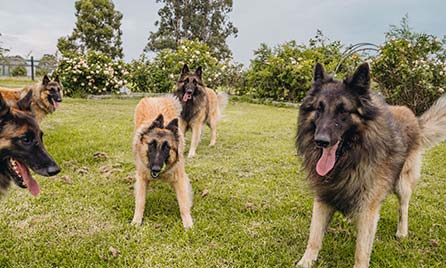
Rescues
Welfare organisations like often have puppies available for adoption. These too will be desexed, vaccinated and well socialised. You can inspect them by appointment and assess the puppy for yourself. Once again, there may be a ‘cooling off period’ available too. These pups are usually from ‘accidental matings’ and while we may know the mother of the litter, we may never know the father, or fathers! The staff are well equipped to help you make the correct choice, and so many people look on this as these would be ‘orphans’, a second chance at life. I commend those that take on a mature dog, say over the age of two, they are really doing their bit for dogs as a whole. Don’t dismiss this idea, as it will bypass all those puppy problems that some find hard to deal with.
Puppy love
It’s really all about love. Do dogs love us? Do they simply see us as a food source, and a place of shelter? Having never been without a dog, I can answer ‘yes’ they do love us, but the way in which they express this love can be very different to the way we do. We call this Unconditional Love. They don’t look for a reward, but appreciate it when given. For dogs it’s all about scent. Yes, your smell! Their noses can pick up odours some 35,000 to 100,000 times better than us with our miserable little appendages. Their ability to store smells in a large library in their brain far exceeds the small area our brains possess. Remember, no matter which dog you pick, your furry friend will love you unconditionally.
More soon on what to do when you get your fur baby home.
Why pick Everyday Pet Insurance?
Related articles.
- text
-
= The gap is defined as the difference between the vet's invoice and the claim benefit under your policy. Policy terms and conditions apply. GapOnly® is only available at participating Vets. Please visit GapOnly® to search for GapOnly® enabled vets. GapOnly® is a trademark owned by PetSure (Australia) Pty Ltd (PetSure) (ABN 95 075 949 923, AFSL 420183).
- text
-
>> Once all required claims documentation has been received.
~ Based on PetSure data February 2023 to January 2024.
- text
-
Everyday Pet Insurance policies entered into for the first time prior to 17 July 2023 and subsequent renewals of those policies are issued by The Hollard Insurance Company Pty Ltd ABN 78 090 584 473, AFSL 241436 (Hollard), arranged and administered by PetSure (Australia) Pty Ltd ABN 95 075 949 923, AFSL 420183 (PetSure) and promoted and distributed by Hollard’s Authorised Representative (AR) Woolworths Group Limited ABN 88 000 014 675, AR 245476 (Woolworths).
Everyday Pet Insurance policies entered into for the first time on or after 17 July 2023 and subsequent renewals of those policies are issued by PetSure and promoted and distributed by PetSure’s AR, Woolworths.Dr Harry Cooper (AR No.1000933) is an AR of PetSure and promotes Everyday Pet Insurance policies.
Any advice provided is general only and does not take into account your individual objectives, financial situation or needs. Please consider the Product Disclosure Statement (PDS) to ensure this product meets your needs before purchasing, or choosing to continue with the product. PDS and Target Market Determination available at insurance.everyday.com.au/pet-insurance.
